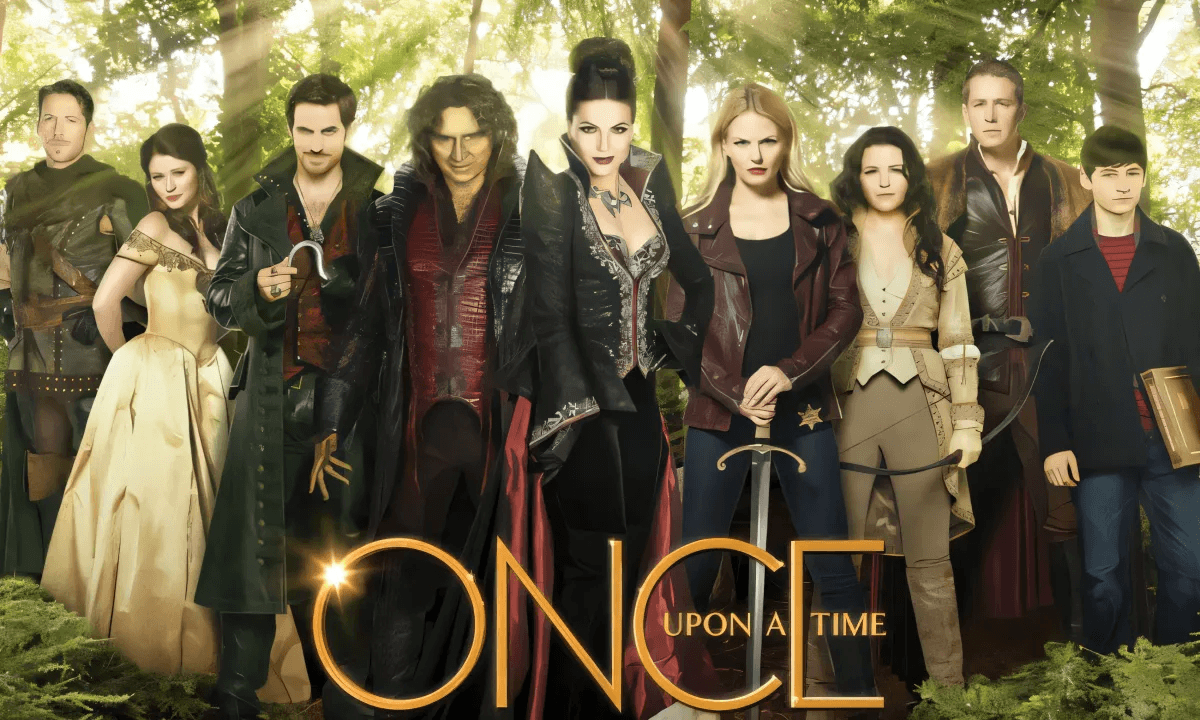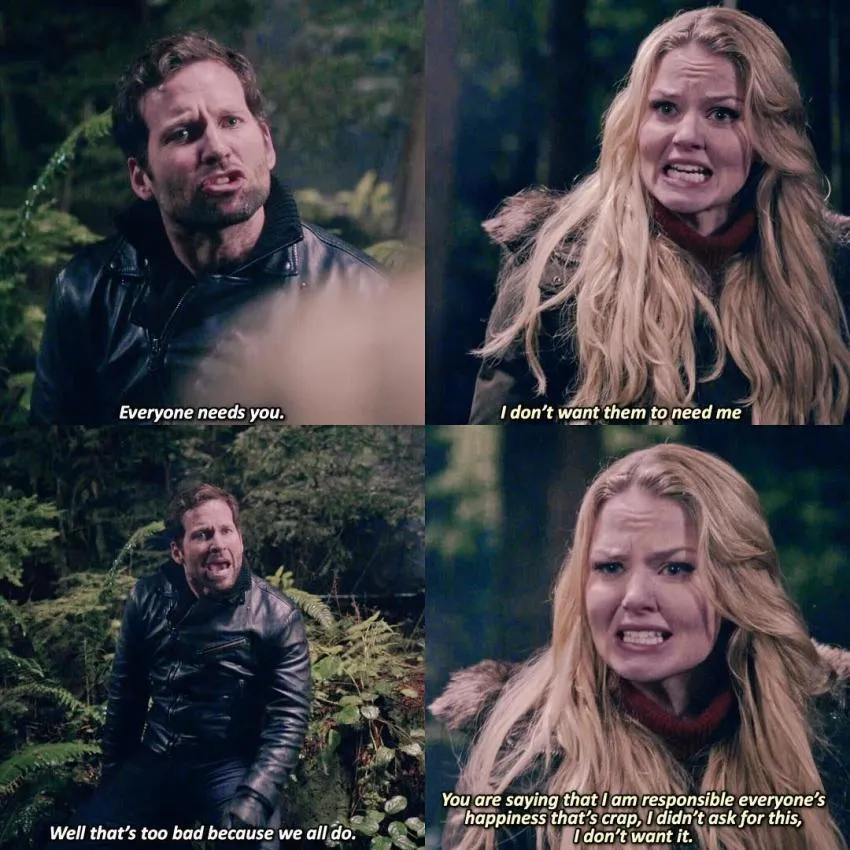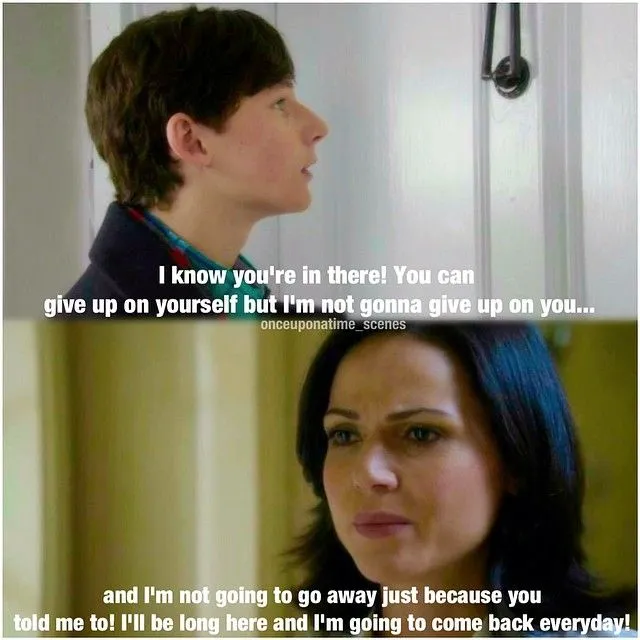What ABC’s Show “Once Upon A Time,” Says About Doubt

In the show “Once Upon A Time,” the main character Emma Swan is a skeptical person who believes only her reality of the world, which is that the world is cruel since she’s lived as an orphan, making her feel worthless. However, her beliefs about herself, her past, and the world are challenged when a boy named Henry Mills shows up at her front door and drags her to Storybrooke.
Storybrooke is a small town where fairytale characters are frozen in time living modern lives with their past erased from their memories. Henry tries to convince her that she’s meant to break their curse and calls her the savior, but she refuses to believe anything he says.
But because Henry is her biological son, the idea of being a savior makes her feel the weight of the title’s expectations since he’s putting value into her existence, making her feel guilty for giving him up. So she then focuses on trying to subtly disprove his theory before leaving. Though the longer she stays, the longer she gets involved in people’s lives, which kicked started her life there since her interactions landed her a job as a sheriff.
Henry then uses his time to convince her by connecting characters’ appearances, jobs, and personalities to their past as events unfold. Either or, Emma finds a way to ground the events in reality. But as the sheriff of the town, Emma helps with each event that occurs, so her actions increase Henry’s faith in Emma being the savior, which triggers her in a good and bad way.
Emma Swan’s Denial Of Self-worth And Value Is From Trauma.
Because Henry is consistent with Emma, Emma got attached to him, that she began to care about the way he sees her and worries once he sees reality, he would no longer need nor want her in his life. At least she believes she’ll be useless to him. With that said, Henry gave her purpose and makes her feel valued, something she never felt.
However, the idea that the whole town needs her is overwhelming. It’s easy to understand that she has value to her son as a mother, but outside of Henry, it’s difficult to comprehend why she matters. So as more events unfold with contradicting evidence that Emma can’t explain, it never made her believe in Henry’s theory since it would mean she has value to the town.
Though when a stranger named Augustus arrives in town, he tells her that Henry is telling the truth and reveals why she was orphaned. She thinks he’s crazy, so he resorts to showing her his leg, which was slowly turning into the wood, but she doesn’t see anything wrong, revealing her disbelief is too strong.
But Augustus concludes that it’s not disbelief, but her not wanting to believe. He says this and more, which she responds to emotionally, “I don’t want them to need me… I didn't ask for this, I don’t want any of it!”

Afterward, Emma takes Henry away in the middle of the night to leave Storybrooke, but he stops her and tells her not to run away, that she’s just scared and is experiencing the moment before she accepts her destiny. And he’s right, she is scared.
For someone who was orphaned and alone for 28 years, all she knew was pain, making her doubt any value people placed on her life. Her doubt then reveals how our past can shape our perspective on ourselves, hindering our growth. So because Emma has abandonment issues, she refuses to grow close to someone, which she did emotionally by keeping a wall up and physically by moving around the states every two years.
Yet during her time in Storybrooke, she got close to Mary Margaret, which she only backtracked with by her runaway attempt since Augustus’s truth dump dropped her far off her comfort zone.
Regina And Mr. Gold’s Doubt Is Different, But They’re Related To The Past.
Though she’s not the only one that doubt stops. Regina, the evil queen, mayor, and Henry’s adoptive mother, goes through a redemption arc, but she struggles with doubt before she goes through it. She initially wanted redemption at the beginning of her evil backstory, but she quickly shut down all hope when Snow White denied her that chance, making it difficult for her to change later on when more horrific things are added to her name.
However, confident in her self-worth, her doubt is external and lies in how others perceive and act with her. Regina is then Emma’s inverted reflection of how peoples’ perceptions based on the past can demotivate someone from changing.
This same theme is played with Mr. Gold or aka Rumplestiltskin, but instead, he experiences self-doubt with the inability to change since he indulged in power via magic for centuries. With it, he would do evil acts to anyone who slightly crossed him, after all, he was treated poorly most of his life.
Though once Belle entered his life, he slowly changed for her since she was able to see and believe in the kind man he can truly be. Her role then shows that it only takes one person to believe in us to believe in ourselves, which is continuously supported with Henry believing in Regina and Emma as they learn to have faith in themselves.

Henry is then the embodiment of hope, especially since he’s claimed as the truest believer. Snow White and David also have hope, which has always made them resilient in all types of situations.
Confidence Can Be A Bad Thing When Pride Is Involved.
However, ironically David’s confidence in his moral compass has led him to make mistakes since he doesn’t question his actions. He believes his right all the time, so he doesn’t see his mistakes until Snow White points them out to him. But sometimes, she can be too late when she points them out.
In the past, when Snow and David were going to execute the evil queen, Snow changes her mind. What makes it late is that they killed so many guards and army men without hesitation to get to the evil queen, making their deaths a waste, but they never question the morally of that, seeing that the battle and focus was on the evil queen.
Yet when Snow killed Cora, another evil magic wielder, she felt extreme guilt and blackened her heart. But what about the other people who didn’t deserve to die? No, her heart was clean from that murder. Same with David, who only does the right thing to be a hero. Snow White initially started the rebellion to take the kingdom back because David convinced her, making him look like a shallow person, considering that his concern was on her birthright as queen.
To add on, it wasn’t until after they gained their kingdom back when they felt responsible for the lives of their citizens, making their care superficial which in turn influences Regina’s decisions as a hero. In one of the scenes, when the group defeats a villain named Zelena, Regina decided to spare her life because it was the “right thing to do” as a “hero,” when in reality a hero’s nature is defined by the compassion which none display besides Emma since she’s empathic.

“Once Upon A Time,” then reveals through its characters how our past can influence the perception of others and ourselves. But how the faith of one person can motivate us to change.
Emma was stuck in her abandonment issues from trauma, Regina was stuck from not being socially accepted, while Rumple was stuck from addiction, fear, and self-doubt. Though each of them grew and changed when they had someone who believed in them.
However, confidence attached to pride can cause us to misjudge our actions, which is seen with David and his desire for the kingdom and the execution of the evil queen. This then shows how doubt is an inhibitor of growth but necessary to have during ethical events.
Note: The examples I gave are taken are from seasons between one to three.
Opinions and Perspectives
It's interesting how everyone's doubt manifests differently but still holds them back in similar ways.
The complexity of these fairy tale characters makes them feel so much more real and relatable.
I think the show does a great job showing how our past shapes our present choices.
The way magic represents different things for different characters is really clever writing.
Emma's growth throughout these seasons is subtle but consistent. You can see her walls slowly coming down.
Henry's absolute faith in both his mothers shows such emotional maturity for his age.
Mary Margaret and David's flaws make them more interesting than typical fairy tale heroes.
The contrast between Emma's self-doubt and Regina's confident villainy is such great writing.
I think Regina's struggle with redemption is actually more realistic than if it had been easier.
Emma's journey from skeptic to believer is so well crafted. It never feels forced.
The way doubt manifests differently in each character adds such depth to the story.
Henry's role as the truest believer is so crucial to everyone's character development.
I love how the show explores different types of doubt through various characters.
This analysis really helped me understand why Emma resists her role as savior for so long.
Augustus's confrontation with Emma about her choosing not to believe is such a turning point.
The parallel between Emma and Regina as mothers is interesting. Both love Henry but express it in such different ways.
Belle's ability to see the good in Rumple reminds me of Henry's ability to see the potential in everyone.
I appreciate how the show doesn't make redemption easy. Both Regina and Rumple struggle repeatedly with their choices.
The way Emma processes trauma is so realistic. Her walls aren't just emotional, they're physical with her constant moving.
It's fascinating how Henry's unwavering belief affects both his mothers in different ways.
Snow White's guilt over killing Cora versus her lack of remorse for the guards really shows the complexity of morality in the show.
The article misses how Emma's job as sheriff slowly builds her connection to the community, making her eventual acceptance of being the savior more believable.
Regina's journey from villain to hero is one of my favorite parts of the show. It proves change is possible, even if it's hard.
That scene where Emma tries to leave town with Henry is heartbreaking. You can feel her terror at being needed.
The show really captures how our past shapes our present in ways we don't always recognize.
I want to point out that Emma's denial isn't just stubbornness. Its a survival mechanism from years of disappointment.
Rumple's transformation is fascinating because it shows how love can inspire change, but doesn't guarantee it. His struggle feels very real.
The way Emma connects with Henry despite her fears shows such growth. Its beautiful watching her slowly lower her walls.
Augustus trying to show Emma his wooden leg is such a powerful scene. Her inability to see it really drives home how deep her denial runs.
Mary Margaret's relationship with Emma is so touching, especially knowing their true connection as mother and daughter.
I think we're being too hard on David. His confidence helped save them numerous times.
The article makes a great point about how confidence without self-reflection can be dangerous. David's character really shows this.
Emma's resistance to being the savior makes so much sense when you consider her background. Who would believe in themselves after being abandoned like that?
The whole idea of being frozen in time in Storybrooke is such a perfect metaphor for being stuck in our past trauma.
Regina's fear of not being accepted really hits home. Sometimes its easier to be the villain people expect than to try changing and risk rejection.
Mr. Gold's struggle with magic reminds me of how hard it is to break any deeply ingrained habit. Belle's influence shows the power of unconditional love.
Snow White's character is more complex than I initially realized. Her moral choices aren't always as pure as traditional fairy tales would have us believe.
But what about the cost of always running away? Emma's pattern of moving every two years really shows how deep her trust issues run.
The show really demonstrates how one person's belief in us can change everything. We all need a Henry in our lives.
I never thought about how Henry represents hope in such a literal way. His role is much deeper than just being the kid who brings Emma to Storybrooke.
Looking at seasons 1-3, it's amazing how much groundwork they laid for these character arcs.
The way trauma shapes these characters' worldviews is so well written. I particularly connect with Emma's tendency to run when things get too real.
You make a good point about David's moral compass, but I think his character flaws make him more relatable.
Interesting analysis but I feel it misses how Emma's role as sheriff gradually builds her confidence before the bigger savior reveal.
The contrast between Snow White's guilt over Cora versus the guards they killed is such an interesting point I never considered before.
I found the way magic serves as a metaphor for addiction in Rumplestiltskin's story particularly clever. His struggle with power mirrors real-world battles.
Am I the only one who thinks Regina's redemption arc was rushed? Real change takes more time than what we saw.
The show really nails how trauma affects our ability to trust and believe in ourselves. Emma's resistance to being the savior feels so authentic.
What really strikes me is how Henry acts as a catalyst for change in both his moms. That kid's belief in others is powerful stuff.
True, but remember how his stubbornness nearly got them killed multiple times? It's a double-edged sword.
Actually, I disagree that David's confidence is always a negative thing. His unwavering belief sometimes helped the group push through impossible situations.
The parallel between Emma and Regina's different types of doubt is fascinating. One doubts herself, while the other doubts others' ability to see her differently.
I love how the show explores Emma's struggle with self-worth. Her character development really resonates with me as someone who's dealt with similar trust issues.
